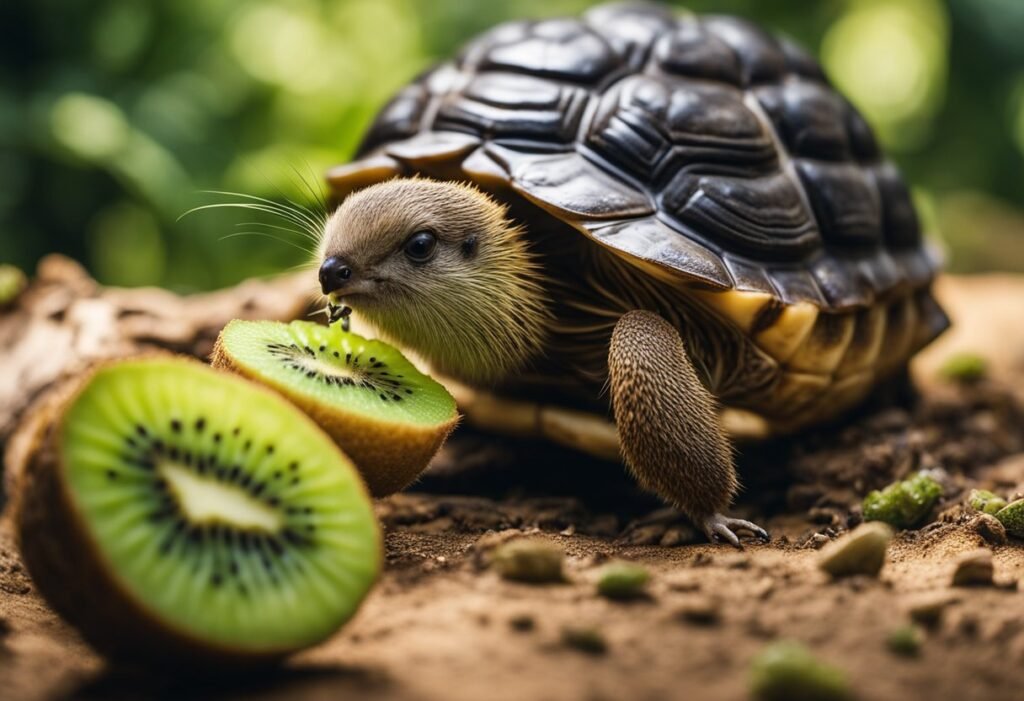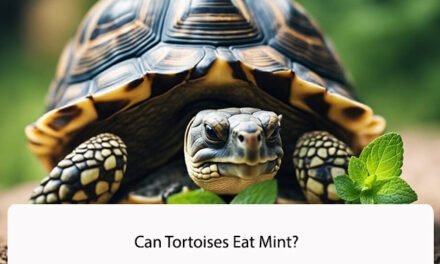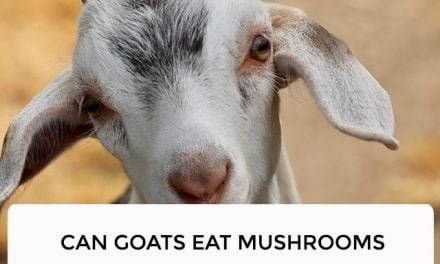Tortoises are known for their slow movements and a diet that consists mainly of leafy greens and vegetables. However, as owners of these gentle creatures, we often wonder what other foods we can offer them. One such food that we may be curious about is kiwi. Can tortoises eat kiwi?
Kiwi is a tasty and nutritious fruit that is packed with vitamins and minerals. It is also low in calories and high in fiber, making it a healthy snack for humans. But what about tortoises? While tortoises are herbivores, not all fruits and vegetables are safe for them to eat. So, can tortoises safely consume kiwi, or should we avoid offering it to them altogether?
What Tortoises Eat

Tortoises are herbivores, which means they eat mostly plants. In the wild, they eat a variety of vegetation, including grasses, leaves, flowers, and fruits.
A tortoise’s diet should be high in fiber and low in protein and fat. A diet that is too high in protein and fat can lead to health problems such as shell deformities and liver disease.
It’s important to provide a balanced diet for your tortoise. Some good food options for tortoises include:
- Dark, leafy greens such as kale, collard greens, and dandelion greens
- Other vegetables like carrots, squash, and bell peppers
- Fruits like strawberries, raspberries, and kiwi (in moderation)
When feeding your tortoise, it’s important to provide a variety of foods to ensure they are getting all the nutrients they need. You can also supplement their diet with calcium and vitamin D3 to keep their bones healthy.
In addition to providing a healthy diet, it’s important to make sure your tortoise has access to fresh, clean water at all times. You can also mist their enclosure with water to help maintain the proper humidity levels.
Overall, a balanced diet and proper care are essential for keeping your tortoise healthy and happy.
The Nutritional Value of Kiwi
Kiwi is a delicious fruit that is also packed with nutrients. It is low in calories and high in fiber, making it a great addition to a healthy diet. Here are some of the key nutritional benefits of kiwi:
- Vitamin C: Kiwi is an excellent source of vitamin C, which is important for immune function, skin health, and wound healing. In fact, just one medium kiwi contains more than 100% of the recommended daily intake of vitamin C.
- Vitamin K: Kiwi is also a good source of vitamin K, which is important for bone health and blood clotting.
- Fiber: Kiwi is high in fiber, which can help regulate digestion and promote feelings of fullness.
- Antioxidants: Kiwi contains a variety of antioxidants, including vitamin C, vitamin E, and carotenoids, which can help protect against cellular damage and reduce the risk of chronic diseases.
- Potassium: Kiwi is a good source of potassium, which is important for heart health and blood pressure regulation.
Overall, kiwi is a nutritious and delicious fruit that can be a great addition to a healthy diet.
Can Tortoises Eat Kiwi

Tortoises are herbivorous animals that can consume a variety of fruits and vegetables. Kiwi is a fruit that is often enjoyed by humans, but can tortoises eat kiwi as well? In this section, we will explore whether or not kiwi is a suitable food for tortoises.
Digestive System of Tortoises
Tortoises have a unique digestive system that allows them to break down tough plant material. They have a large intestine and a cecum, which is a pouch that ferments plant material. This fermentation process allows tortoises to extract nutrients from plants that would otherwise be indigestible.
While tortoises can eat a variety of fruits, they should be given in moderation. Fruits are high in sugar and can cause digestive issues if consumed in large quantities. It is important to note that tortoises should not be given any fruit that contains seeds as they can cause intestinal blockages.
Potential Health Risks
Kiwi is a fruit that is high in vitamin C and fiber, which are both beneficial for tortoises. However, kiwi also contains high levels of oxalic acid. Oxalic acid can bind to calcium, which can lead to the formation of calcium oxalate crystals. These crystals can cause health issues such as bladder stones and gout.
If you decide to feed your tortoise kiwi, it should be given in small quantities and only as an occasional treat. It is important to monitor your tortoise for any signs of digestive issues or health problems.
In conclusion, while kiwi can be a healthy treat for tortoises, it should be given in moderation due to its high oxalic acid content. As with any new food, it is important to introduce it slowly and monitor your tortoise’s reaction.
How to Feed Kiwi to Tortoises
When it comes to feeding kiwi to tortoises, there are a few things you should keep in mind to ensure that your pet stays healthy and happy. Here are some tips on how to feed kiwi to tortoises.
Portion Size
As with any food, it’s important to give tortoises kiwi in moderation. Kiwi is high in sugar and acid, so feeding too much of it can cause digestive problems. We recommend giving your tortoise small amounts of kiwi as a treat, rather than as a regular part of their diet.
Preparation Methods
Before feeding kiwi to your tortoise, you should prepare it properly. First, wash the kiwi thoroughly to remove any dirt or pesticides. Then, peel off the skin and cut the kiwi into small pieces. You can either serve the kiwi as is, or mix it with other fruits and vegetables to create a healthy salad for your tortoise.
It’s important to note that some tortoises may not like the taste of kiwi, so don’t be discouraged if your pet doesn’t seem interested in it. If your tortoise does enjoy kiwi, be sure to monitor their behavior and digestion to ensure that they are tolerating it well.
Overall, kiwi can be a healthy and tasty treat for tortoises when given in moderation. By following these tips, you can safely feed kiwi to your pet and provide them with a nutritious snack.
Alternatives to Kiwi for Tortoises

If you’re looking for alternatives to kiwi for your tortoise, there are a few options to consider. While kiwi is a great source of vitamin C and other nutrients, it’s important to offer a variety of foods to ensure your tortoise is getting a balanced diet.
Some alternatives to kiwi for tortoises include:
- Berries: Strawberries, raspberries, and blueberries are all great options for tortoises. They’re high in vitamin C and other nutrients, and most tortoises enjoy them.
- Melons: Watermelon, cantaloupe, and honeydew are all good choices for tortoises. They’re high in water content and provide a good source of hydration.
- Leafy Greens: Dark leafy greens like kale, collard greens, and dandelion greens are all good options for tortoises. They’re high in calcium and other nutrients that are important for tortoise health.
- Squash: Butternut squash, acorn squash, and other types of squash are all good options for tortoises. They’re high in fiber and provide a good source of hydration.
It’s important to offer a variety of foods to ensure your tortoise is getting all the nutrients they need. Be sure to research any new foods before offering them to your tortoise to make sure they’re safe and healthy.
Frequently Asked Questions

Are kiwis safe for tortoises to eat?
Yes, kiwis are generally safe for tortoises to eat. However, it is important to note that not all tortoises have the same dietary requirements, so it is always best to consult with a veterinarian before introducing new foods into your pet’s diet.
Can tortoises consume kiwi as part of their diet?
Yes, kiwi can be included as part of a tortoise’s diet. Kiwis are a good source of vitamin C and fiber, which can be beneficial for tortoises. However, it is important to only offer kiwi in moderation as too much fruit can upset a tortoise’s digestive system.
Is kiwi a recommended fruit for tortoises?
While kiwi can be a healthy addition to a tortoise’s diet, it is not necessarily a recommended fruit. Tortoises require a diet that is high in fiber and low in sugar, so it is important to offer a variety of fruits and vegetables to ensure a balanced diet.
What are the potential risks of feeding kiwi to tortoises?
The main risk of feeding kiwi to tortoises is overfeeding. Too much fruit can lead to digestive issues, such as diarrhea. Additionally, the high sugar content in fruit can lead to obesity and other health problems if not offered in moderation.
Are there any other fruits that tortoises should avoid?
Tortoises should avoid fruits that are high in sugar, such as bananas and grapes. Additionally, fruits that have a high water content, such as watermelon, should be offered in moderation.
How often can tortoises be fed kiwi?
Tortoises can be fed kiwi as a treat once or twice a week. It is important to monitor their intake and ensure that they are not consuming too much fruit.





